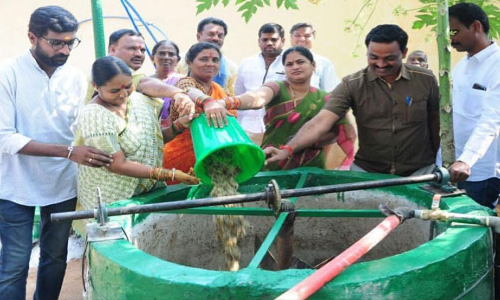Live
- Head Constable Dies by Suicide, Cites harssament by wife and inlaws
- Delhi BJP claims AAP govt will never pay women allowance like in Punjab
- India is 'Mother of Democracy': PM Modi
- ‘One nation, one election’ will undermine India’s federal structure: Mehbooba Mufti
- ‘Bachhala Malli’ trailer heightens anticipation
- Karnataka quota row: Backward Class forum chief warns Lingayat seer over 'tinkering with reservations'
- Tight security arrangements at Group-II examination centers District SP
- Alia Bhatt captures attention in white
- Varun Dhawan talks about ‘Baby John’
- ‘Moonwalk’ trailer promises a quirky heist, love, and loyalty
Just In
Dulapally GP supplies bio-gas to govt school, Anganwadi


Setting a great example of sustainable growth in villages of Telangana, the Dulapally Gram Panchayat has taken a step ahead of waste segregation to ensure that their surroundings are clean and healthy.
Dulapally: Setting a great example of sustainable growth in villages of Telangana, the Dulapally Gram Panchayat has taken a step ahead of waste segregation to ensure that their surroundings are clean and healthy.
Deriving bio-gas out of household and hotel wastes comprising leftovers, rotting fruits, vegetable peels etc, the Panchayat has replaced it with traditional firewood cooking to provide mid-day meals at Government Primary School and Anganwadi Centres in the area, catering to nearly 160 children and pregnant mothers.
Where in all parts of the State, children are being given classroom lessons on the Swachh Telangana initiative, students at this state-run education centre in Dulapally are lucky enough to experience it practically on a day-to-day basis.
"The idea of recycling waste was that of our district Collector Dr M V Reddy. But our Gram Panchayat members and I had researched ways in which it could be implemented with limited resources and that it should benefit the future generations of the State. We also went through youtube videos on bio-digesters and spoke to experts in the field about replacing cow dung with wet wastes.
After a thorough study and discussion sessions, we built up two bio digesters worth up to Rs 1.3 lakh near the school premises, from the Panchayati fund, in November 2017 on an experimental basis. Though initially, we kept making changes to the model like adding a waste crusher to increase the biogas production or increasing storage of the biogas in a big specially designed balloon by SP Eco-Fuel firm,
the effort was all worth it when we observed that the cooks no longer had health issues and we were saving a lot on the school's cooking expenditure." gleams C Laxmi Devender, Sarpanch of Dulapally Gram Panchayat.
Starting at 4 am in the morning, municipal workers in the area dump the wet waste from hotels and neighbouring households near the Bio-digester plant and take the plastic with them. Then a dedicated staff of the Gram Panchayat gets them crushed into a paste in a specifically designed grinder following which they are put into the Bio-digesters where methane gas (bio-fuel) and remaining slurry are collected separately.
While the gas is diverted to the school's kitchen to prepare lunch for the students, the leftovers are either used as manure for the Haritha Haram plants or are reused in vermicomposting pits in Dulapally.
Would you believe that the seven feet wide bio-digesters are producing nearly 4 kilograms of methane gas from 60 to 80 kg of wet waste every day thereby saving the government school up to Rs 50 on every kilo unit of Liquefied Petroleum Gas(LPG) that we use at home! Members of the Gram Panchayat also reveal that unlike petroleum products, biogas has no odour and when if accidentally leaked, it would not cause any harm to the lives of children studying near the biogas plant.
Thus, assessing the advantages of bio-fuel in promoting a healthy environment in the village community, it is said that the Gram Panchayat is planning to establish a bigger plant at the Government High School and also to procure eco-friendly fuels from wastes at public toilets. Now, this is what we call a real solid progress towards a Swachh Telangana!
By Maitreyi Tadepalli and Pathi Madhav

© 2024 Hyderabad Media House Limited/The Hans India. All rights reserved. Powered by hocalwire.com






